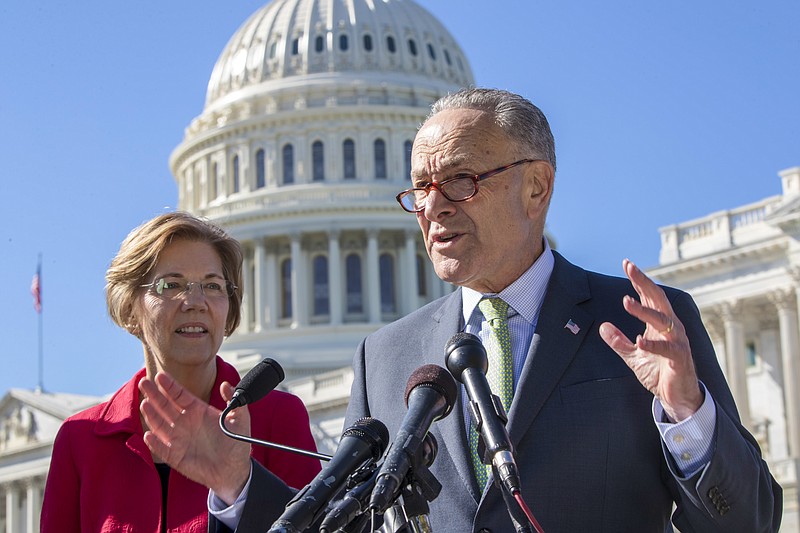WASHINGTON (AP) - The Republican-led Senate rejected Democratic attempts to spare health programs for the poor and elderly from cuts, absorbing political hits as the price for advancing a $4 trillion budget plan that's a crucial step in the GOP's drive to rewrite the tax code later this year.
In rapid-fire party-line votes, Republicans defended cuts to Medicare of almost $500 billion over the coming decade as well as a provision to curb the Medicaid health program for the poor by twice as much.
"Do you want to cut Medicaid or not, yes or no? Do you want to cut Medicare or not, yes or no?" top Senate Democrat Chuck Schumer, of New York, said. "Do you want to vote for a $1.5 trillion deficit or not, yes or no?"
Republicans controlling the Senate, on track to pass the budget measure later this week, rejected the Democratic moves on back-to-back 51-47 votes. They appear to be on cruise control to pass the budget today or early Friday morning. Rand Paul, R-Ky., is the only Republican to come out against the measure, while more moderate Republicans who bucked the party on health care earlier this year such as Susan Collins, of Maine, are backing the effort.
At issue is a non-binding budget plan that proposes, in theory, a set of significant changes to the nation's fiscal trajectory, including cuts to health care programs for the poor, a slew of unspecified cuts to other programs, and maintaining tight spending restraints on annual operating budgets for the Pentagon and domestic Cabinet departments. Republicans, however, have no plans to actually impose those cuts with follow-up legislation.
"Anything that we do here has to be completed in other committees in order to ever happen," Budget Committee Chairman Mike Enzi, R-Wyo., said. "But this budget does slow Medicare's projected annual rate of growth by approximately 1 percent."
Democrats blasted Republicans for the cuts and not doing enough about the growing budget deficit, which the Congressional Budget Office said rose to $668 billion in the just-completed fiscal year.
"The majority party in the Senate has been focused on the debt and the deficit and the dangers of debt to our country, to our economy, and how bad it was that we were mortgaging our children's future," Sen. Angus King, I-Maine, said. "And all of a sudden it's no big deal. All of a sudden it's OK."
The driving purpose of the measure is to take advantage of Washington's arcane budget rules to set up a filibuster-proof debate later this year on rewriting the tax code. It would permit lawmakers to use $1.5 trillion in debt-financed tax cuts to ease passage of a follow-up plan to sharply reduce corporate rates, cut taxes for most individuals, and slash taxes on business partnerships such as law firms, medical practices, and accounting firms.
"The fact is, most of the rest of the world has been about the business of improving their tax code while we have not," Sen. Pat Toomey, R-Pa., said. "This is our moment, our opportunity to catch up, and we could do it in a big way as long as we pass this budget."
The budget measure also would revive long-moribund efforts to permit drilling for oil in Alaska's Arctic National Wildlife Refuge, a longstanding goal of Senate Energy Committee Chairwoman Lisa Murkowski, R-Alaska.

